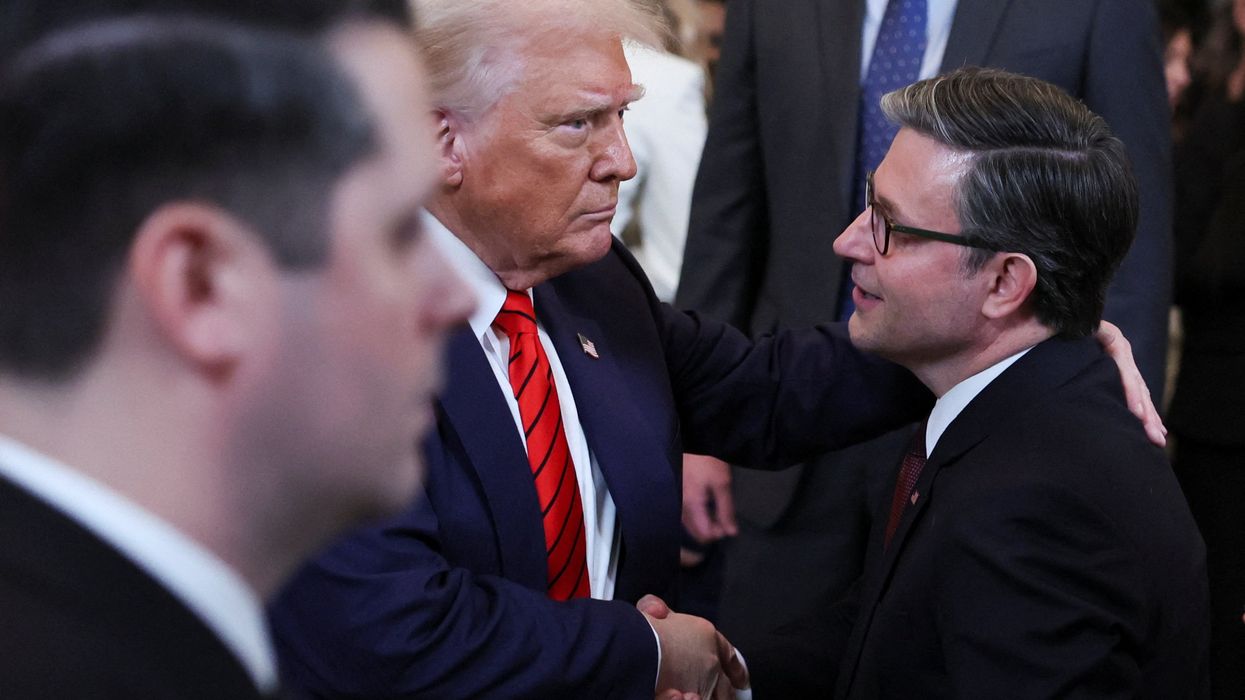
U.S. President Donald Trump shakes hands with Speaker of the House Mike Johnson, after signing an executive order banning transgender girls and women from participating in women's sports, in the East Room at the White House in Washington, U.S., February 5, 2025.
REUTERS/Leah Millis
February 06, 2025
ALTERNET
There is one thread that ties together Trump’s destruction of American government agencies, his offer to take the Gaza crisis off Israel’s hands and dump it on our military, and senators’ and representatives’ failure to challenge him: This is how kingdoms operate. Rule by decree.
It proves that we’re asking the wrong question.
Plug “Can American democracy survive Trump?” into a search engine and you’ll find thousands of websites, blogs, articles, and podcasts devoted to that one, single question.
But American democracy was kneecapped by five Republicans on the Supreme Court years ago when they ruled that money was the same thing as “free speech”; that corporations are “persons” with rights under the Bill of [Human] Rights; and that political operatives can engage in virtually unlimited purges of voting rolls, accompanied by racial- and gender-targeted laws to make it harder to vote.
The correct question is: “Can the American system — now that it’s become flooded with dark money and the ‘right to vote’ has become a mere privilege in Red states — ever again represent the interests of average citizens? Can we ever return to democracy?”
In an open call on X yesterday with Republican Senators Joni Ernst and Mike Lee, apartheid billionaire Elon Musk — whose father says he was chauffeured to school in white-run South Africa in a Rolls Royce — lit into the regulations that created and protect the American middle class and our democracy:
“Regulations, basically, should be default gone. Not default there, default gone. And if it turns out that we missed the mark on a regulation, we can always add it back in.
In a child-like echo of Ayn Rand, Musk added:
“These regulations are added willy-nilly all the time. So, we’ve just got to do a wholesale, spring cleaning of regulation and get the government off the backs of everyday Americans so people can get things done. … If the government has millions of regulations holding everyone back, well, it’s not freedom. We’ve got to restore freedom.”
Both capitalism and democracy could be likened to a game — say, football — ideally played to benefit the largest number of people by creating and guaranteeing “Life, Liberty, and the pursuit of Happiness.”
But imagine if the NFL were to suspend their regulations just before this Sunday’s Super Bowl. And the Chiefs, like most elected Democrats, chose to continue playing by the old regulations, but the Eagles started gut-punching, facemask-pulling, and even threw five extra players onto the field.
The only team that would ever win would be the one most willing to play dirty or buy off the refs. And, increasingly, that’s where we are today, both with our democracy and our economy.
We know this is crazy: Every state in the union has put into place an agency to regulate insurance companies because that very industry has a long, horrible history of ripping people off and refusing to pay claims unless the power of the state is invoked against them.
We regulate banks and brokerages for the same reason; when we deregulated them in the 1920s and the late 1990s the result was huge rip-offs that produced the Republican Great Depression and the Bush Crash of 2008.
We regulate automobile manufacturers because they have a history of putting profits over the lives of their customers (Ford Pinto 900 dead, GM trucks 2000 dead, etc.); refineries because their emissions cause cancer and asthma; drugs because unscrupulous manufacturers killed people in previous eras; workplace safety after the Triangle Shirtwaist fire killed 146 young women; voting because corrupt politicians rigged elections.
We regulate traffic with signs and stoplights to keep order and reduce accidents; we regulate police to prevent them from abusing innocent people; we regulate building codes so peoples’ homes don’t collapse or catch on fire from faulty cheap wiring.
And there was a time in America when we regulated money in politics and guaranteed the right to vote.
Those two types of regulations were passed in the late 19th and early 20th centuries after multiple scandals, like in 1899 when William Clark — then the nation’s second-richest man — openly bribed Montana legislators by standing outside the legislative chamber passing out brand new $1000 bills to the men who voted his way. Or when state after state — most all former Confederate states — repeatedly refused to allow Black people to vote.
We passed regulations guaranteeing a minimum wage, unemployment insurance, and the right to unionize to create the world’s first large-scale middle class. And we regulated the morbidly rich with a 90% income tax rate to prevent them from amassing so much wealth that their financial power could become a threat to our democratic republic.
And, of course, it’s those regulations — money in politics, the right to vote, and preventing the accumulation of dangerous levels of wealth — to which today’s broligarchs most strenuously object.
In each case, it was five Republicans on the US Supreme Court who gutted our protective regulations and put America on a direct collision course with today’s oligarchic neofascist takeover.
— They ruled that billionaires can buy politicians because giving money in exchange for votes isn’t bribery, but merely an expression of First Amendment-protected “free speech.”
— They claimed that corporations aren’t soulless creations of the law but are “persons” with the same right to share their “free speech” with politicians who do their bidding.
— And they ruled that voting is not a right in America — in open defiance of US law — but a mere privilege, giving the green light to Republicans to purge or refuse to count over 4 million votes in the 2024 election.
The result of all this Republican corruption is that the will of the majority of American voters hasn’t been fulfilled in two generations. The last time our political system was truly responsive to the voters was in the 1960s, when Medicare, Medicaid, and food stamps were created, and the Civil Rights and Voting Rights Acts were passed. And in the early 1970s, when we outlawed big money in politics.
Then, in 1978, five Republicans on the Supreme Court ruled in the Bellotti decision (written by Lewis Powell himself) that corporations are persons and money is merely free speech. Two years later, Reagan floated into the White House on a river of oil money and systematically began gutting the protective regulations that had built the largest and most successful middle class the world had ever seen.
Since then, big money has frozen us like a mosquito in amber. Even Obama’s big effort to establish a national healthcare system with an option for Medicare had to kneel before the throne of rightwing billionaires and the insurance industry.
Every developed country in the world has some variation on a free or low-cost national healthcare system, and free or even subsidized higher education. In most developed countries homelessness is not a crisis, nobody goes bankrupt because somebody in their family got sick, and jobs pay well enough (and have union pensions) so people can retire after 30 or 40 years in the workforce and live comfortably for the rest of their lives.
But not in America. Since the Reagan Revolution, rightwing billionaires have blocked any of those things from happening because they’d be paid for with taxes, and there’s nothing rightwing billionaires hate more than paying taxes.
— Dark money has destroyed the notion of one-person-one-vote.
— Monopoly — allowed because corporations can now buy politicians — has destroyed the small businesses that once filled America’s malls and downtowns.
— And voter suppression and voter list purges handed the 2024 election to Trump, as reporter Greg Palast documented in a recent, shocking report.
So, yeah, let’s do away with all the regulations like wannabe Kings Elon and Donald say. And make the United States look and operate more like Syria and its failed-state relatives than anything Americans would recognize.
After all, freedumb!
There is one thread that ties together Trump’s destruction of American government agencies, his offer to take the Gaza crisis off Israel’s hands and dump it on our military, and senators’ and representatives’ failure to challenge him: This is how kingdoms operate. Rule by decree.
It proves that we’re asking the wrong question.
Plug “Can American democracy survive Trump?” into a search engine and you’ll find thousands of websites, blogs, articles, and podcasts devoted to that one, single question.
But American democracy was kneecapped by five Republicans on the Supreme Court years ago when they ruled that money was the same thing as “free speech”; that corporations are “persons” with rights under the Bill of [Human] Rights; and that political operatives can engage in virtually unlimited purges of voting rolls, accompanied by racial- and gender-targeted laws to make it harder to vote.
The correct question is: “Can the American system — now that it’s become flooded with dark money and the ‘right to vote’ has become a mere privilege in Red states — ever again represent the interests of average citizens? Can we ever return to democracy?”
In an open call on X yesterday with Republican Senators Joni Ernst and Mike Lee, apartheid billionaire Elon Musk — whose father says he was chauffeured to school in white-run South Africa in a Rolls Royce — lit into the regulations that created and protect the American middle class and our democracy:
“Regulations, basically, should be default gone. Not default there, default gone. And if it turns out that we missed the mark on a regulation, we can always add it back in.
In a child-like echo of Ayn Rand, Musk added:
“These regulations are added willy-nilly all the time. So, we’ve just got to do a wholesale, spring cleaning of regulation and get the government off the backs of everyday Americans so people can get things done. … If the government has millions of regulations holding everyone back, well, it’s not freedom. We’ve got to restore freedom.”
Both capitalism and democracy could be likened to a game — say, football — ideally played to benefit the largest number of people by creating and guaranteeing “Life, Liberty, and the pursuit of Happiness.”
But imagine if the NFL were to suspend their regulations just before this Sunday’s Super Bowl. And the Chiefs, like most elected Democrats, chose to continue playing by the old regulations, but the Eagles started gut-punching, facemask-pulling, and even threw five extra players onto the field.
The only team that would ever win would be the one most willing to play dirty or buy off the refs. And, increasingly, that’s where we are today, both with our democracy and our economy.
We know this is crazy: Every state in the union has put into place an agency to regulate insurance companies because that very industry has a long, horrible history of ripping people off and refusing to pay claims unless the power of the state is invoked against them.
We regulate banks and brokerages for the same reason; when we deregulated them in the 1920s and the late 1990s the result was huge rip-offs that produced the Republican Great Depression and the Bush Crash of 2008.
We regulate automobile manufacturers because they have a history of putting profits over the lives of their customers (Ford Pinto 900 dead, GM trucks 2000 dead, etc.); refineries because their emissions cause cancer and asthma; drugs because unscrupulous manufacturers killed people in previous eras; workplace safety after the Triangle Shirtwaist fire killed 146 young women; voting because corrupt politicians rigged elections.
We regulate traffic with signs and stoplights to keep order and reduce accidents; we regulate police to prevent them from abusing innocent people; we regulate building codes so peoples’ homes don’t collapse or catch on fire from faulty cheap wiring.
And there was a time in America when we regulated money in politics and guaranteed the right to vote.
Those two types of regulations were passed in the late 19th and early 20th centuries after multiple scandals, like in 1899 when William Clark — then the nation’s second-richest man — openly bribed Montana legislators by standing outside the legislative chamber passing out brand new $1000 bills to the men who voted his way. Or when state after state — most all former Confederate states — repeatedly refused to allow Black people to vote.
We passed regulations guaranteeing a minimum wage, unemployment insurance, and the right to unionize to create the world’s first large-scale middle class. And we regulated the morbidly rich with a 90% income tax rate to prevent them from amassing so much wealth that their financial power could become a threat to our democratic republic.
And, of course, it’s those regulations — money in politics, the right to vote, and preventing the accumulation of dangerous levels of wealth — to which today’s broligarchs most strenuously object.
In each case, it was five Republicans on the US Supreme Court who gutted our protective regulations and put America on a direct collision course with today’s oligarchic neofascist takeover.
— They ruled that billionaires can buy politicians because giving money in exchange for votes isn’t bribery, but merely an expression of First Amendment-protected “free speech.”
— They claimed that corporations aren’t soulless creations of the law but are “persons” with the same right to share their “free speech” with politicians who do their bidding.
— And they ruled that voting is not a right in America — in open defiance of US law — but a mere privilege, giving the green light to Republicans to purge or refuse to count over 4 million votes in the 2024 election.
The result of all this Republican corruption is that the will of the majority of American voters hasn’t been fulfilled in two generations. The last time our political system was truly responsive to the voters was in the 1960s, when Medicare, Medicaid, and food stamps were created, and the Civil Rights and Voting Rights Acts were passed. And in the early 1970s, when we outlawed big money in politics.
Then, in 1978, five Republicans on the Supreme Court ruled in the Bellotti decision (written by Lewis Powell himself) that corporations are persons and money is merely free speech. Two years later, Reagan floated into the White House on a river of oil money and systematically began gutting the protective regulations that had built the largest and most successful middle class the world had ever seen.
Since then, big money has frozen us like a mosquito in amber. Even Obama’s big effort to establish a national healthcare system with an option for Medicare had to kneel before the throne of rightwing billionaires and the insurance industry.
Every developed country in the world has some variation on a free or low-cost national healthcare system, and free or even subsidized higher education. In most developed countries homelessness is not a crisis, nobody goes bankrupt because somebody in their family got sick, and jobs pay well enough (and have union pensions) so people can retire after 30 or 40 years in the workforce and live comfortably for the rest of their lives.
But not in America. Since the Reagan Revolution, rightwing billionaires have blocked any of those things from happening because they’d be paid for with taxes, and there’s nothing rightwing billionaires hate more than paying taxes.
— Dark money has destroyed the notion of one-person-one-vote.
— Monopoly — allowed because corporations can now buy politicians — has destroyed the small businesses that once filled America’s malls and downtowns.
— And voter suppression and voter list purges handed the 2024 election to Trump, as reporter Greg Palast documented in a recent, shocking report.
So, yeah, let’s do away with all the regulations like wannabe Kings Elon and Donald say. And make the United States look and operate more like Syria and its failed-state relatives than anything Americans would recognize.
After all, freedumb!

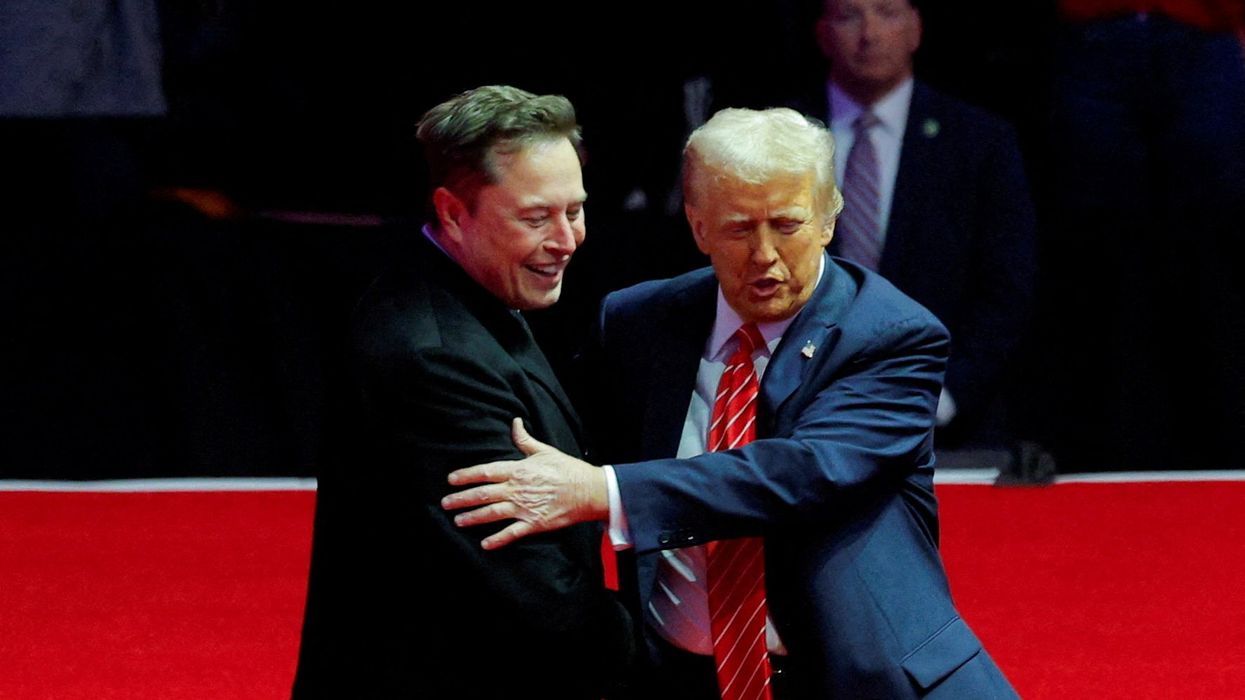

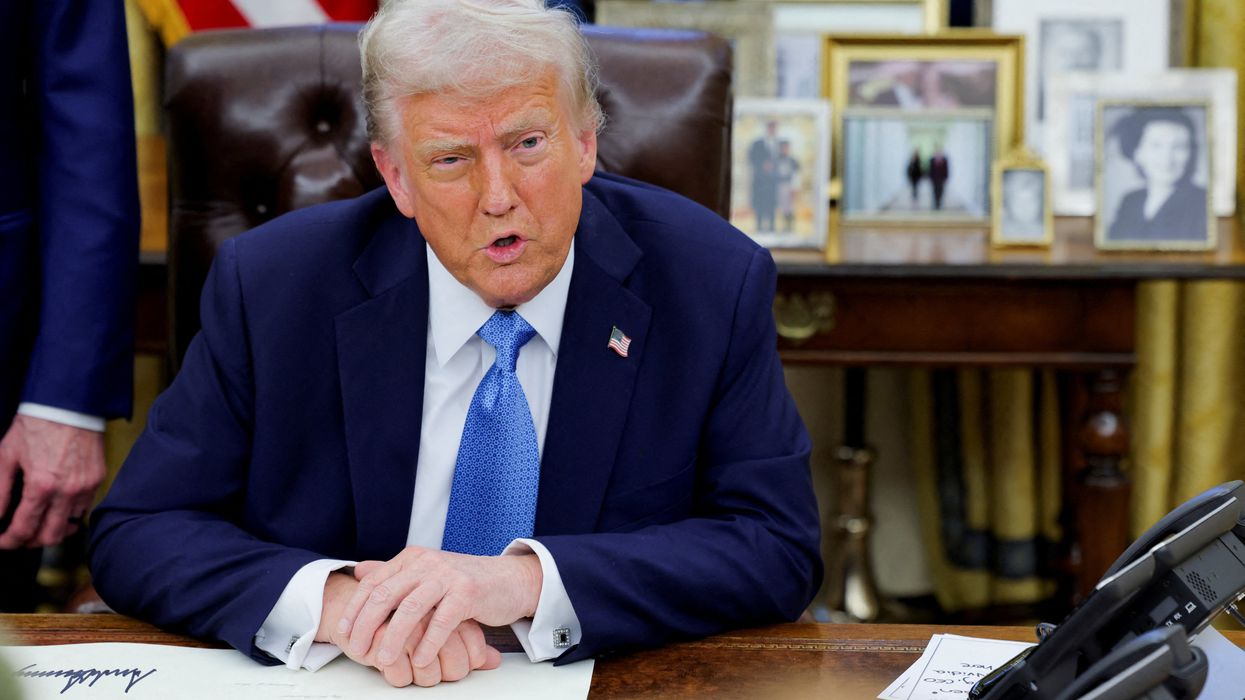











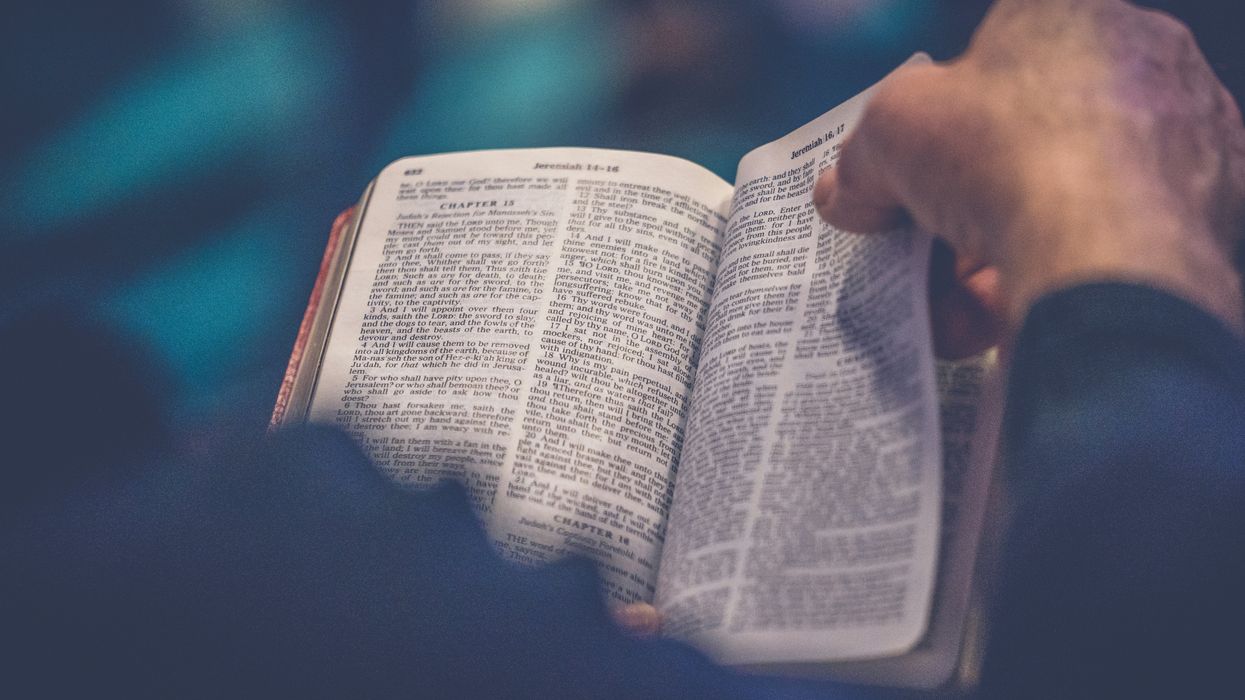
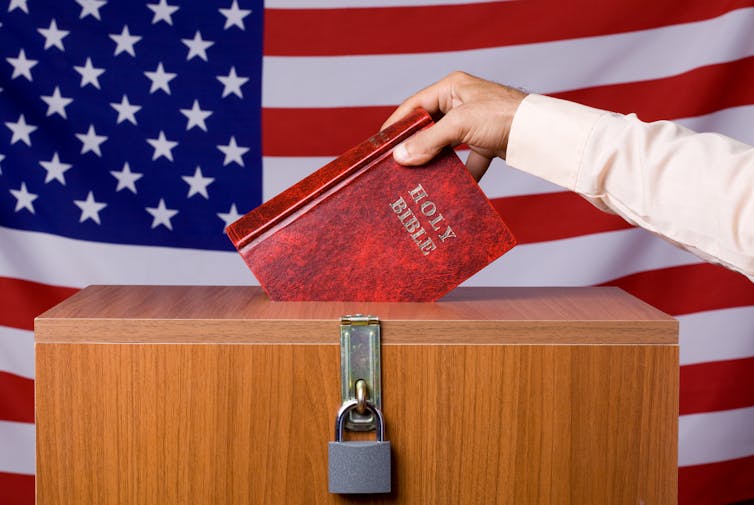 Researchers found that support for Christian nationalism was strongly associated with the moral foundations of loyalty, sanctity and liberty.
Researchers found that support for Christian nationalism was strongly associated with the moral foundations of loyalty, sanctity and liberty. 

